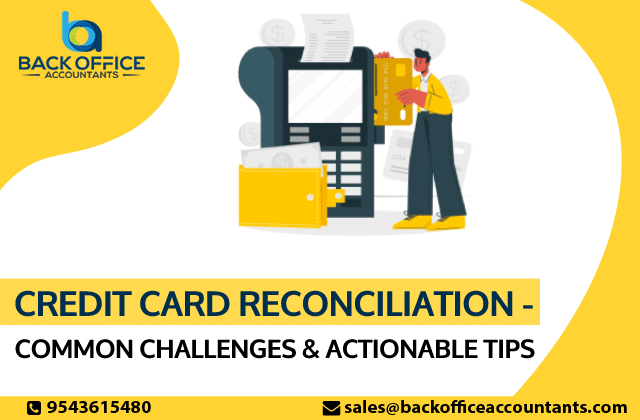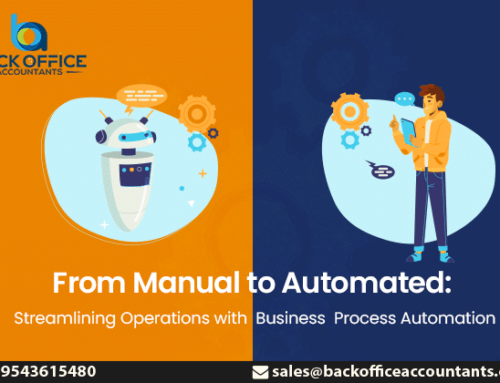As a business grows at a faster pace, sales and revenue increase and as does the transaction volume. Consequently, the need for accurate accounting in terms of bookkeeping and reconciliation for better financial health and cleaner books quickly grows too.
For a small and medium business that is on its way to growth, it is only a matter of time to reach a point where the business transactions far exceed the internal accounting team’s ability to efficiently handle account reconciliation. If you are a small and medium business in the same boat, the best thing you can do is to make yourself aware of all the impending challenges in the way to fortify your reconciliation process beforehand.
Being one of the best remote accounting firms in the business, Back Office Accountants is well versed with all the problems SMBs face with credit card reconciliation and in this blog here we make you aware of a few of them and provide you actionable tips to improve recompilation process. Read on:
Credit Card Reconciliation – Common Challenges faced by Small and Medium Business:
Increased volume of transactions:
As a business grows, so do the sales and transactions. Though the credit card gives you more power, convenience and flexibility to manage your business expenses, the number of transaction does increase exponentially making it difficult to reconcile them efficiently.
The process may become even tougher when the data has to be pulled from multiple cards from different categories, employees and even departments. As a result, human errors creep-in, duplicate submissions ensue, and inaccurate information can happen when the volume of transactions increases.
Reduced accuracy of credit card reconciliations:
The increased burden is not the only side effect of heavy transactions. The accuracy of reconciliation and efficiency of the whole process will take a big hit if the accounting team is burdened with heavy volume with less time for reconciliation.
For credit card reconciliations, a single-digit error or single missing entry can mean a financial miscalculation which is more prone to happen for businesses adopting traditional reconciliation processes. Even discerning and accounting for personal expenses for multiple credit cards and identifying the financial errors made by credit card issuers and vendors is a huge task in itself.
Time-consuming policy violations checks:
The most time-consuming process in credit card reconciliation is verifying the policy violations which is painstakingly hard since there is no automated process other than to manually verify them. Take a small and medium business where a single credit card is passed around or shared cards are used by multiple personnel. This credit card usage can pose multiple problems where reconciliation – in case of incorrect payments or missing receipts you never know who to consult or how to verify.
Manual process, paper receipts, diverse data sources:
The large volume of transactions, accurate reconciliations, time-consuming policy checks – all these problems only grow and end up more complicated when resorting to traditional process with paper receipts. When it comes to credit card reconciliation, paper receipts is one more additional document that suffers the risk of misplacement – which makes it harder for reconciliation. Even for businesses that use varied payment methods – it can be burdensome to access, identify and reconcile all the transaction from various sources.
That said, a business cannot completely avoid these problems but can adopt better practices to reduce the inaccuracies and overall burden on your accounting team. Being a remote accounting firm, Back Office Accountants regularly work with businesses of all sizes to help them reconcile their bank accounts and credit cards accurately and efficiently. And here are few actionable tips that can help you improve your credit card reconciliation process as well:
1. Single card per user – Shared credit cards are an absolute menace that increases the risk of financial fraud and makes reconciliation harder. If you can afford it, issuing a separate credit card for each person can reduce the risk – but makes sure you enforce strict guidelines.
2. Automate capture of receipts – Misplaced receipts is the most common problem faced during reconciliation and automating them is a simple step that saves a lot of burden during reconciliation. Single cards come with a mobile banking app that provides automatic receipts. Employees can also be directed to take a snapshot of the receipt immediately after the purchase to ensure easy collection and filing of the receipts.
3. Automate your reconciliation – Paper receipts and manual reconciliation must be done away with, if any business aims to significantly improve their reconciliation process. Though resorting to digital receipts can ease the process a bit, significant benefits can be accrued from having reconciliation and management software that identifies, categorizes, exports, and matches the payments automatically.
While the above two steps above can be adopted by business, automation of reconciliation can be a much more complicated process that needs thorough expertise and investment. If you are only starting-out and automation may not seem practical for you at this point, you can simply outsource bank account and credit card reconciliation requirements to remote accounting firms like Back Office Accountants.
Equipped with advanced accounting software and tools, our team of accountants and bookkeeping experts at Back Office Accountants can provide you with an accurate, efficient, timely and affordable Bank account and credit card reconciliation services at an affordable price point. You can contact us here: https://www.backofficeaccountants.com/







